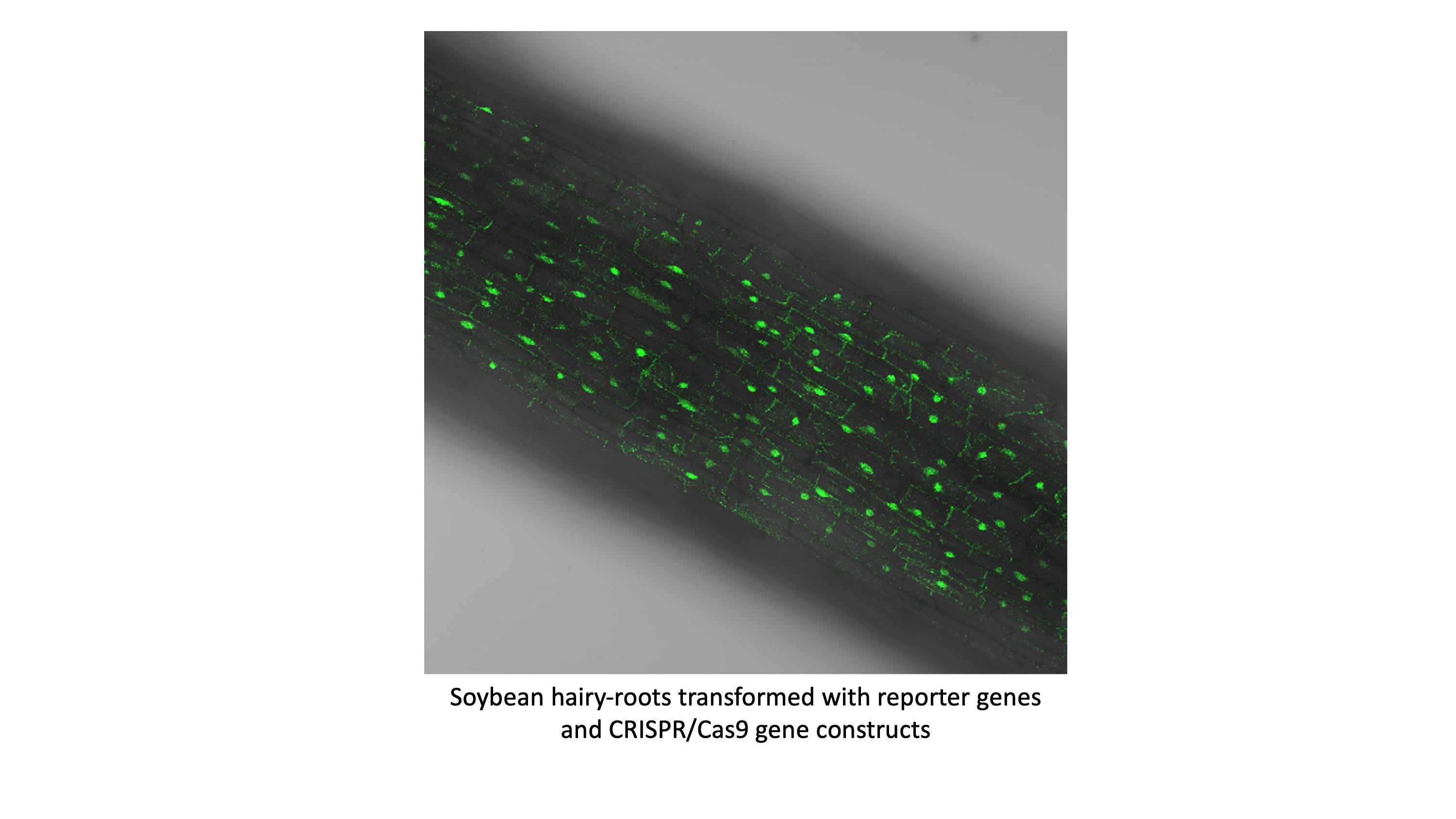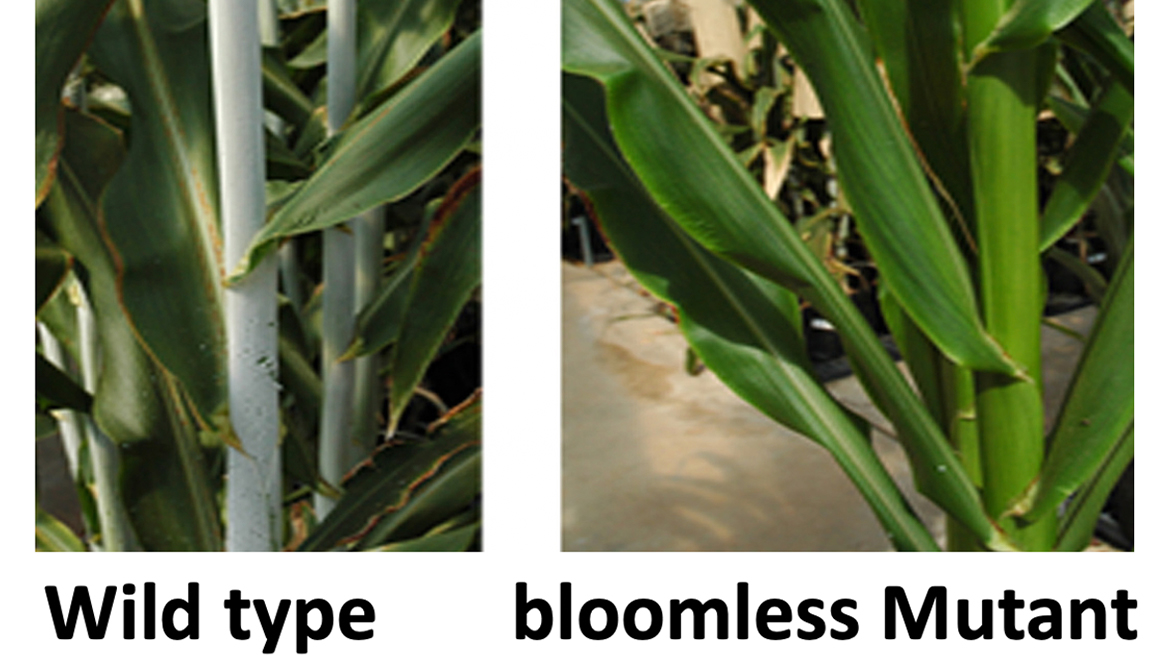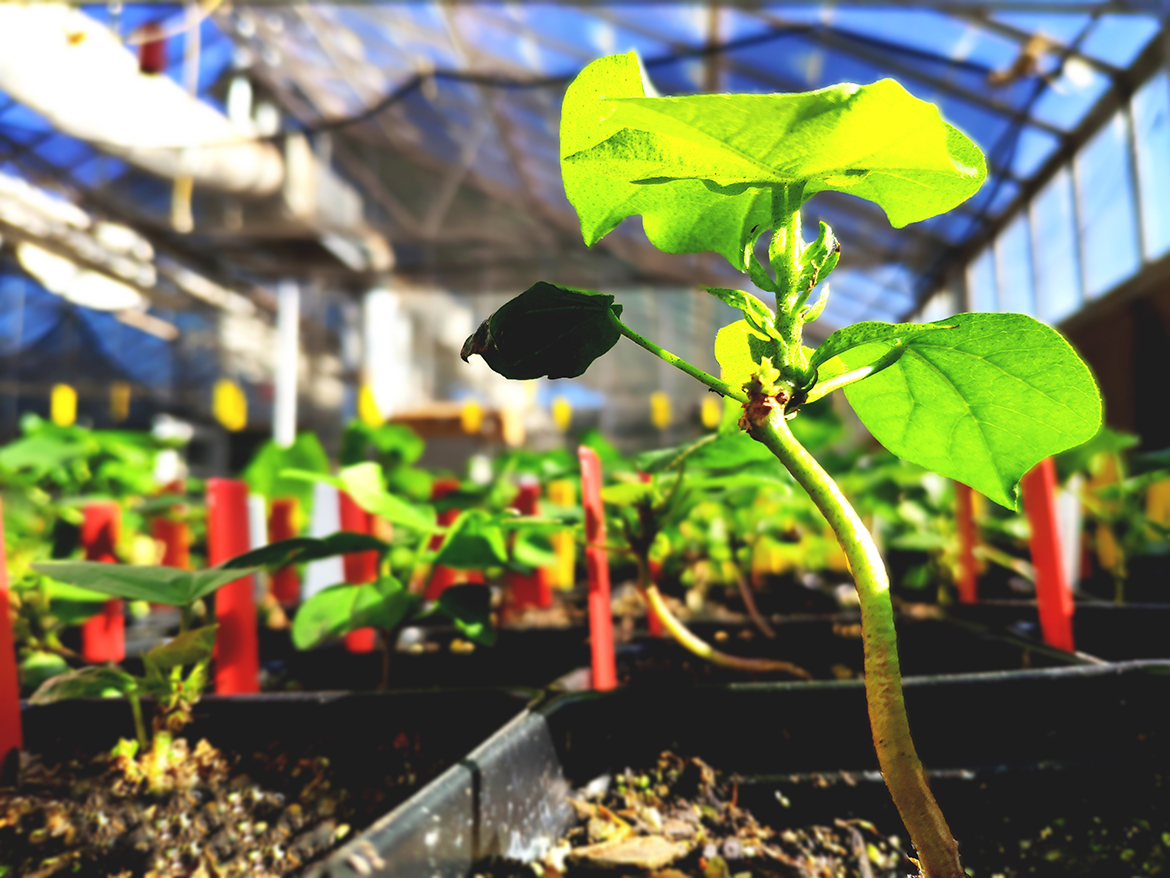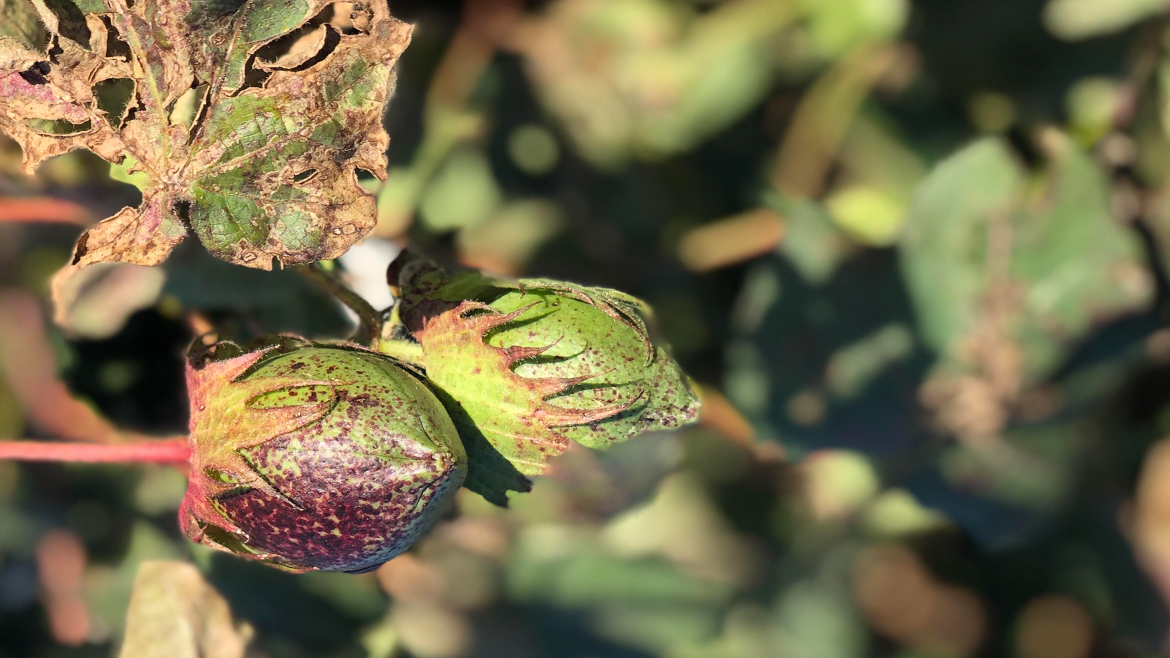IGCAST Research in Progress
Exploring the potential of exotic alleles and rhizosphere microbiomes for enhancing crop stress tolerance in the face of climate uncertainties
Start date: 03/2023
Principle Investigator: Dr. Son Tran, Faculty, IGCAST
Climate change poses a significant challenge to crop production in arid and semiarid regions, necessitating the development of climate-resilient crop varieties. Successful adaptation strategies rely on leveraging genetic variability underlying desirable traits. However, modern elite wheat cultivars exhibit limited genetic diversity. To overcome this limitation, recent advancements have focused on creating synthetic hexaploidy wheat (SHW) lines by hybridizing tetraploid durum wheat (AABB sub-genome) with the wild Aegilops tauschii (DD genome), followed by backcrossing and crossing with elite wheat cultivars. This approach has resulted in a synthetic derivative population with extensive genetic diversity. The ongoing research project aims to investigate the multisynthetic derivative (MSD) population of wheat to identify genetic loci associated with salt and heat stress tolerance. This investigation will utilize bulk transcriptome, bulk metabolome, and genome-wide association analysis (GWAS) techniques to precisely identify specific genetic regions contributing to wheat's ability to withstand salt and heat stresses. The strategic objective is to incorporate these advantageous genetic alleles into wheat breeding programs, thereby developing high-yielding wheat cultivars capable of thriving amidst the uncertainties of future climate change. Despite substantial evidence highlighting the interaction between host genetics and plant microbiota composition, identifying the specific genetic elements responsible for host-genotype-dependent acquisition and assembly of microbiota in plants remains challenging. In this project, we aim to dissect the genetic control exerted by the host on microbiota composition in rhizospheres using a diverse population of legume and cereal crops. Furthermore, we will explore the feasibility of employing GWAS to identify specific genetic loci within the host genome, which are responsible for the abundance of heritable microbial lineages. Additionally, we will investigate whether the differences in microbiome composition can be predicted solely based on genotypic information. Collectively, this work will demonstrate the utility of GWAS in analyzing the host's role in shaping the composition and abundance of rhizosphere microbiota associated with various crops. Moreover, findings will contribute to the development of microbial consortia that can be directly applied to crops for improvement of crop performance and yield under non-stress and stress conditions.
Collaborators: Mostafa Abdelrahman, Aarti Gupta, Arifur Khan, and Md. Mezanur Rahman.
Roles and regulation of hormones and their crosstalk in plant responses to abiotic stresses
Start Date: 01/2021
Principle Investigator: Dr. Son Tran, Faculty, IGCAST
Abiotic stresses, including drought, salinity, and high temperatures, adversely affect crop performance and productivity, necessitating studies that lead to development of stress-resilient crops. The importance of hormones in driving the plant responses to stresses and optimizing the growth and developmental processes is undisputed. Understanding the hormone signaling pathways in the context of plant stress responses has been a major theme of our lab. Though the discovery of hormones and their functions dated back to more than a century, continuing research is still uncovering their novel roles, spatio-temporal regulations, and interactions among different hormones. Our research revolves around deciphering the roles and novel regulators of cytokinin, strigolactone, Karrikin, and gibberellic acid signaling pathways in plant responses to drought, high temperatures, and salinity. We employ a range of well-established and innovative physiological, biochemical, molecular, and genetic approaches in the model plant Arabidopsis thaliana, and research findings can be then explored in various crops through translational genomics. To establish the functions of these hormones in regulating plant stress responses, we quantify the plant growth and development by assessing plant phenotype, photosynthetic parameters, reactive oxygen species, action of antioxidant systems in loss-of-function mutants defective in hormone metabolic and/or signaling pathways. In addition, by employing comparative omics (e.g., transcriptomics and metabolomics) we will identify molecular switches regulating hormone-mediated processes and their crosstalk. Results of this study will have a significant impact on the understanding of the regulatory networks modulated by individual hormones and their crosstalk in plant responses to abiotic stress(es). Furthermore, the success of this project will open the way to improve crop performance and productivity under varying environmental conditions using genetic engineering to ensure food security in the era of climate change.
Collaborators: Luis Herrera-Estrella, Aarti Gupta, Chien Ha, Mostafa Abdelrahman, Mezanur Rahman, and Sanjida Keya.
Exploration of signaling molecules and bio-stimulants for improvement of crop growth and performance under abiotic stress conditions
Start date: 01/2021
Principle Investigator: Dr. Son Tran, Faculty, IGCAST
Abiotic stresses (drought, heat, salt, cold, and their combinations) negatively affect plant yield worldwide, requiring the development of efficient strategies for generating stress-resilient crops. In Tran's lab, we analyze the roles of signaling molecules (non-hormones and hormones) and bio-stimulants in regulating the responses of crops (e.g., cotton, common bean, corn, soybean, and sorghum) to various stresses to develop simple and cost-effective technologies, which are applicable in both low- and high-income countries for improvement of crop performance to ensure sustainable agricultural outputs under stress conditions. We focus on how these signaling molecules modulate key morphological, physiological, biochemical, and molecular mechanisms associated with crop performance and tolerance to abiotic stress(es). To identify the downstream genes/pathways mediated by signaling molecules in plant abiotic stress responses, we will carry out the comparative transcriptomic, metabolomic, and proteomic analyses. In particular, we determine the effects of abiotic stress(es) on parameters associated with growth and development, photosynthesis efficiency, and antioxidant system activities, as well as on molecular changes in various crops under normal and abiotic stress conditions. Results of this project will have a significant impact on the understanding of the regulatory networks modulated by studied signaling molecules and bio-stimulants in plant responses to abiotic stress(es). Furthermore, the success of this project will allow us to identify master regulators, which can be used in genetic engineering for improvement of crop performance and production under various abiotic stress conditions.
Collaborators: Luis Herrera-Estrella, Chien Ha, Aarti Gupta, Mostafa Abdelrahman, Arifur Khan, Md. Mezanur Rahman, Sanjida Keya, and Touhidur Rahman Anik.
Technologies to improve nutrientuptake and reduce excess fertilizer use in soybean
Start Date: 01/2021
Principle Investigator: Dr. Gunvant B. Patil, Faculty, IGCAST
The goal of this project is to identify soybean lines that can efficiently uptake and utilize nutrients that are available in soil. These lines can ultimately reduce the excess application of fertilizers and micro-nutrient in the farmer's field. The long-term goal is to discover genomic loci, pinpoint the genes and understand the mechanism of selective nutrient uptake in soybean. This research will lay a foundation to develop soybean lines with nutritional seeds and higher yields. With continued support from SSRP and based on the preliminary data, we will be able to discover novel traits to secure higher yield and create a balanced nutritional profile.
Funding By: Southern Soybean Board
Development of a robust regeneration and transformation system in cotton
Start Date: 01/2021
Principle Investigator: Dr. Gunvant B. Patil, Faculty, IGCAST
Genetic variation is the source and basis of plant breeding and crop improvement. However, creating novel genetic variation in crops is largely limited to classical mutagenesis, interspecific crossing and genomics-assisted breeding methods. Creating a target specific mutation in functional gene or regulatory elements offers great potential for accelerating translational research and crop improvement. However, this process can be accomplished via genetic transformation either Agrobacterium or direct delivery method. Several economically important crops (including cotton) are difficult to transform and are genotype-dependent for genetic transformation, plant regeneration, and also lacks robust and efficient delivery of gene-editing reagents. These bottlenecks have impeded the use of gene-editing on a larger scale. To overcome these technological barriers, we aim to develop a robust and widely applicable genetic transformation system in cotton and simultaneously expand the use of this newly developed technology for editing cotton genome to create novel quantitative variants.
Collaborators: Vikas Devkar, Postdoctoral Research Associate, IGCAST.
Funding By: TTU-BASF (Project Revolution)
Next generation soybeans with durable resistance to multiple soybean cyst nematode (SCN) races through genome engineering of Rhg4

Start Date: 10/2020
Principle Investigator: Dr. Gunvant B. Patil, Faculty, IGCAST
The soybean varieties carrying the commonly used rhg1 from PI 88788 are losing the war with SCN in the field. On the other hand, the resistance derived from Peking, which contains Rhg4, works very well in the field. Our recent study also indicates that higher copy numbers of Rhg4 in PI 437654 leads to higher expression of Rhg4 and therefore stronger resistance to multiple SCN races. Therefore, the proposed project aims to develop innovative genetic strategies for enhancing soybean resistance to multiple SCN races by increasing the Rhg4 expression via over-expression and promoter editing using CRISPR/Cas9 to improve resistance to multiple SCN races.
Collaborators: Vikas Devkar, Postdoctoral Research Associate, IGCAST.
Funding By: United Soybean Board
Genome-wide dissection of the regulation of epicuticular wax in sorghum: the first defense line against environmental threats

Start Date: 9/2020
Principle Investigator: Dr. Yinping Jiao, Faculty, IGCAST
The epicuticular wax on the surface of plants is the first defense line against abiotic
and biotic stress. Sorghum, important bioenergy and versatile crop, is also an excellent
model to study the regulation of epicuticular wax. Compared with major grass crops
including maize and rice, sorghum accumulates a much heavier layer of wax on the surface.
The wax contributes to the high water-use efficiency, and other abiotic and biotic
stress tolerance in sorghum. Our previous work identified a key gene involved in the
biosynthesis of epicuticular wax in sorghum. This gene was not reported in other species
and does not have homologs in Arabidopsis, which indicates that sorghum harbors its
unique mechanism to maintain the high load wax to resist the stresses from the environment.
With the long-term goal of improving the resilience of crops to abiotic and biotic
stresses, we are dissecting the pathway of the synthesis of epicuticular wax in sorghum
by a systems biology approach. In this approach, we combine the multiple-omics data
including the classic genetics of the large mutant population, genomics data, transcriptome
profiling and biochemistry analysis. This project will also reveal the mechanism of
the evolution of this trait in the plant kingdom.
The meristem: a pathway to transform cotton plants

Start Date: 8/2019
Principle Investigator: Dr. Luis Herrera-Estrella, Director, IGCAST
The transfer of genes from one organism to another is a natural process that creates variation in biological traits. This concept underlies all attempts to improve agriculturally important species expressing good agronomic characteristics. The advantage of genetic engineering is that it can help to improve plant characters by the direct transfer of one or just a few genes; and, the crop improvement can be achieved in a shorter time compared to conventional breeding. Tissue culture techniques are widely used to create genetically engineered plants. However, this technique is extremely laborious. Therefore, in our lab, we are exploring and applying concepts within the field of developmental biology to improve the obtention of genetically modified plants without culture tissue techniques. We are taking advantage of determination of cell fate in shoot meristem as a pathway to ensure stable inheritance of transferred genes in the progeny of cotton plants.
Collaborators: Dolores Alanis-Gutierrez, Lenin E. Yong-Villalobos, Postdoctoral Research Associate, IGCAST.
Epigenetic strategies for cotton improvement

Start Date: 1/2020
Principle Investigator: Dr. Luis Herrera-Estrella, Director, IGCAST
The hypothesis of this proposal is that chemically or genetically induced methylation changes in cotton can generate epialleles to produce new varieties that address the increasing challenges of cotton production. These challenges are directly correlated with yield performance, fiber yield and quality, environmental factors such as drought and soil fertility, and biological factors such as plant pests and diseases. Hence, cotton crop production can highly benefit from cotton epigenomics to enhance its performance in adverse environmental conditions. It is expected that epigenetic changes could alter gene expression leading to morphological or physiological changes that increase yield. Moreover, it has been reported that changes in DNA methylation and chromatin structure increase recombination frequencies and favor gene amplification processes, therefore, it is possible that by chemically or genetically inducing changes in DNA methylation could lead to an increase in both epigenetic and genetic variants with improved stress tolerance or fiber quality traits.
Collaborators: Lenin Villalobos-Yong, Postdoctoral Research Associate, IGCAST.
Funding By: Cotton Incorporated
Institute of Genomics for Crop Abiotic Stress Tolerance
-
Address
Texas Tech University, Institute of Genomics for Crop Abiotic Stress Tolerance, 1006 Canton Ave, Lubbock, TX 79409 -
Phone
806.742.3417 -
Email
IGCAST.info@ttu.edu
